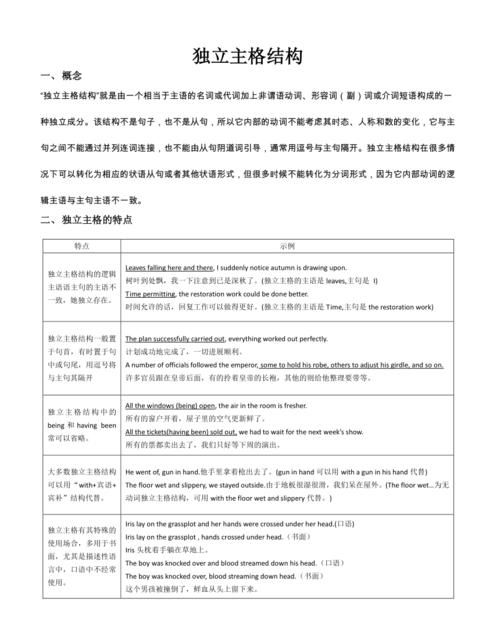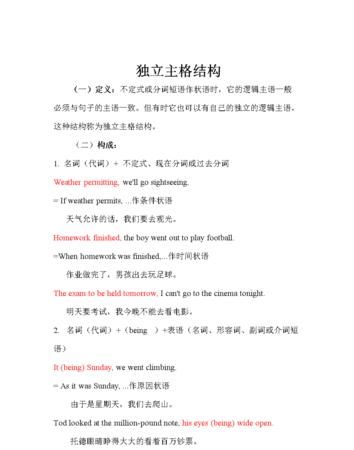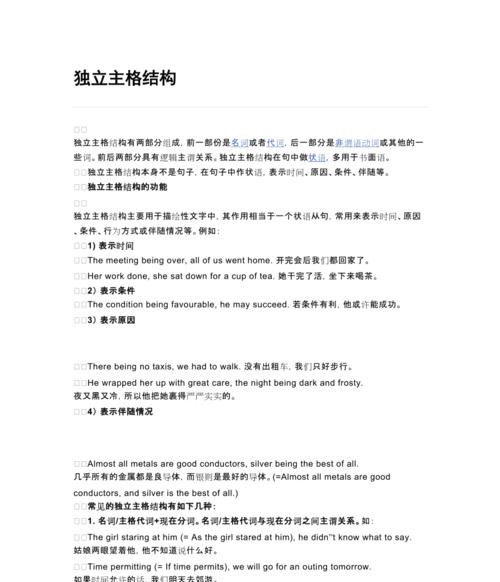本文目录
英语四级语法知识点总结
英语四级考试如何复习,有哪些重要知识点、核心考点,这是许多考生共同的疑问。为了帮助到更多的考试,下文中为大家分类归纳总结了一些英语四级考试的重要知识点,供各位考生参考。
语法类重要知识点
1、虚拟语气的:
would rather+that从句+一般过去时
It is vital/ necessary/ important/ urgent/ imperative/ desirable/ advisable/ natural/ essential+that+(should)动词原形
proposal/suggestion+that+动词原形
It is time/about time/high time+that+一般过去时
lest+that+should+动词原形
if only+that+would+动词原形
2、状语从句的:
非if引导的条件状语从句,此类句子多用at times,provided,so long as,in case,once等来替代if;
由even if/so,now that,for all等引导的让步状语从句;
just/hardly...when引导的时间状语从句;
more than,as...as,not so much as,the same as,as much as等引导的比较状语从句。
3、独立主格结构多以逻辑主语+分词的形式出现。
4、情态动词多与完成时形式连用。
5、定语从句重点考查介词+关系代词(which)和as作为关系代词。
词汇类重要知识点
1、动词、名词与介词的搭配:popular/patient+with;yield/solution/adapt/transfer/access+to;accuse/require+of;charge+for;under+discussion
2、习惯用法:confess to/set about/be used to+doing;be supposed to/have/make sb.+do等。
3、由同一动词构成的短语:come,go,set,break等构成的短语。
4、单个的动词,抽象名词,形容词和副词多以近义词、同义词的形式出现。?
5、介词短语在句中作状语如:in terms of;with the exception of;in vain; rather than,other than,such as,none/nothing+but
6、部分过去式和过去分词不规则变化的动词:
broadcast (broadcast, broadcast) 广播
flee (fled, fled) 逃跑
forbid (forbade, forbidden) 禁止
forgive (forgave, forgiven) 原谅
freeze (froze, frozen) 结冰
hang (作―绞死‖讲,是规则的;作―悬挂‖讲,其过去式过去分词都是hung)
lie –lied –lied 说谎; lie—lay---lain躺下 lay-laid- laid 放置
seek (sought, sought) 寻求
shake (shook, shaken) 发抖
tear (tore, torn) 撕碎

四级语法知识点总结百度云
语法类重要知识点
1、虚拟语气的:
would rather+that从句+一般过去时
It is vital/ necessary/ important/ urgent/ imperative/ desirable/ advisable/ natural/ essential+that+(should)动词原形
proposal/suggestion+that+动词原形
It is time/about time/high time+that+一般过去时
lest+that+should+动词原形
if only+that+would+动词原形
2、状语从句的:
非if引导的条件状语从句,此类句子多用at times,provided,so long as,in case,once等来替代if;
由even if/so,now that,for all等引导的让步状语从句;
just/hardly...when引导的时间状语从句;
more than,as...as,not so much as,the same as,as much as等引导的比较状语从句。
3、独立主格结构多以逻辑主语+分词的形式出现。
4、情态动词多与完成时形式连用。
5、定语从句重点考查介词+关系代词(which)和as作为关系代词。
词汇类重要知识点
1、动词、名词与介词的搭配:popular/patient+with;yield/solution/adapt/transfer/access+to;accuse/require+of;charge+for;under+discussion
2、习惯用法:confess to/set about/be used to+doing;be supposed to/have/make sb.+do等。
3、由同一动词构成的短语:come,go,set,break等构成的短语。
4、单个的动词,抽象名词,形容词和副词多以近义词、同义词的形式出现。?
5、介词短语在句中作状语如:in terms of;with the exception of;in vain; rather than,other than,such as,none/nothing+but
6、部分过去式和过去分词不规则变化的动词:
broadcast (broadcast, broadcast) 广播
flee (fled, fled) 逃跑
forbid (forbade, forbidden) 禁止
forgive (forgave, forgiven) 原谅
freeze (froze, frozen) 结冰
hang (作―绞死‖讲,是规则的;作―悬挂‖讲,其过去式过去分词都是hung)
lie –lied –lied 说谎; lie—lay---lain躺下 lay-laid- laid 放置
seek (sought, sought) 寻求
shake (shook, shaken) 发抖
四六级考试的复习资料:
链接: ***/s/1IjyXaApl26Y_eOHT7PPQhw
?pwd=u8gn 提取码: u8gn

分词复合结构和独立主格结构有什么区别
看看下面的句子:
1. Having finished the work, he went out.
2. Hearing the news, he became very angry.
3. Given more time, we could do it better.
在前两个句子中,主语he和动词完成finish,听到Hear是主动的关系,是主语发出了这两个动作,所以用现在分词短语做状语.在第三个例句中,主语we和动词给予Give是被动关系,主语是这个动作的承受者,既做这个动词的宾语,所以要用过去分词做状语.但他们的共同点是句子的主语与做状语的分词结构中的动词存在主动或者被动的关系.
4. Tom hearing the news, his face turned white.
在这个句子中,主语是his face,它和状语中的动词hear有关系吗?没有任何关系,在这种情况下,就要在分词结构前面加上分词结构中动词的逻辑主语,就构成了分词独立主格结构。
Time permitting, we'll go camping tomorrow.
There being no rain, all the crops are dying.
The problem settled, she felt very happy.
体会一下以上句子中的主语与分词结构中的动词有关系吗?分词结构中的动词的逻辑主语是什么?

英语问题提问20个
独立主格结构是很重要的知识点,要掌握哦
独立主格结构有两部分组成,前一部份是名词或者代词,后一部分是非谓语动词或其他的一些词。前后两部分具有逻辑主谓关系。独立主格结构在句中做状语,多用于书面语。
独立主格结构本身不是句子,在句子中作状语,表示时间、原因、条件、伴随等。
独立主格结构的功能
独立主格结构主要用于描绘性文字中,其作用相当于一个状语从句,常用来表示时间、原因、条件、行为方式或伴随情况等。例如:
1) 表示时间
The meeting being over, all of us went home. 开完会后我们都回家了。
Her work done, she sat down for a cup of tea. 她干完了活,坐下来喝茶。
2) 表示条件
The condition being favourable, he may succeed. 若条件有利,他或许能成功。
3) 表示原因
There being no taxis, we had to walk. 没有出租车,我们只好步行。
He wrapped her up with great care, the night being dark and frosty. 夜又黑又冷,所以他把她裹得严严实实的。
4) 表示伴随情况
Almost all metals are good conductors, silver being the best of all. 几乎所有的金属都是良导体,而银则是最好的导体。(=Almost all metals are good conductors, and silver is the best of all.)
常见的独立主格结构有如下几种:
1. 名词/主格代词+现在分词。名词/主格代词与现在分词之间主谓关系。如:
The girl staring at him (= As the girl stared at him), he didn”t know what to say. 姑娘两眼望着他,他不知道说什么好。
Time permitting (= If time permits), we will go for an outing tomorrow. 如果时间允许的话,我们明天去郊游。
2. 名词/主格代词+过去分词。名词/主格代词与过去分词之间的动宾关系。如:
The problems solved (= As the problems were solved), the quality has been improved. 随着问题的解决,质量已经提高了。
Her glasses broken (= Because her glasses were broken), she couldn”t see the words on the blackboard. 由于眼镜摔坏了,她看不见黑板上的字。
3. 名词/主格代词+不定式。名词/主格代词与不定式之间是主谓关系,且强调的是一次具体性的动作。如:
He is going to make a model plane, some old parts to help. 借助于一些旧零件,他要做一个飞机模型。
They said good-bye to each other, one to go home, the other to go to the bookstore. 他们道别后,一个回了家,一个去了书店。
4. 名词/主格代词+形容词。如:
An air accident happened to the plane, nobody alive. 那架飞机遭遇了空难,无一人生还。
So many people absent, the meeting had to be called off. 这么多人缺席,会议不得不取消。
5. 名词/主格代词+副词。如:
He put on his sweater wrong side out. 他把毛衣穿反了。
The meeting over, they all went home. 会议一结束,他们就都回家了。
6. 名词/主格代词+介词短语。如:
The boy goes to the classroom, book in hand. 那男孩手里拿着书去教室。
Mary was sitting near the fire, her back towards the door. 玛丽靠近火炉坐着,背对着门。
7. There being +名词(代词)如:
There being nothing else to do, we went home. 没有别的事可做,我们就回家了。
There being no further business, I declare the meeting closed. 没有再要讨论的事了,我宣布散会。
8. It being +名词(代词)如:
It being Christmas, the government offices were closed. 由于圣诞节的缘故,政府机关都休息。
It being a holiday, all the shops were shut. 由于今天是假日,所有商店都关门了。
独立主格结构的特点:
1)独立主格结构的逻辑主语与句子的主语不同,它独立存在。
2)名词或代词与后面的分词,形容词,副词,不定 式,介词等是主谓关系。
3)独立主格结构一般有逗号与主句分开。
举例:
The test finished, we began our holiday.
= When the test was finished, we began our holiday.
考试结束了,我们开始放假。
The president assassinated, the whole country was in deep sorrow.
= After the president was assassinated, the whole country was in deep sorrow.
总统被谋杀了,举国上下沉浸在悲哀之中。
Weather permitting, we are going to visit you tomorrow.
如果天气允许,我们明天去看你。
This done, we went home.
工作完成后,我们才回家。
The meeting gone over, everyone tired to go home earlier.
会议结束后,每个人都想早点回家。
He came into the room, his ears red with cold.
他回到了房子里,耳朵冻坏了。
He came out of the library, a large book under his arm.
他夹着本厚书,走出了图书馆
注:独立主格结构有时可在其前加上介词with。
如:Don’t sleep with the windows open. 别开着窗睡觉。
He was lying on the bed with all his clothes on. 他和衣躺在床上。
She came in with a book in her hand. 她手里拿着一本书走了进来。
He fell asleep with the lamp burning. 他没熄灯就睡着了。
I won’t be able to go on holiday with my mother being ill. 因为妈妈有病,我无法去度假。
He sat there with his eyes closed. 他闭目坐在那儿。
All the afternoon he worked with the door locked. 整个下午他都锁着门在房里工作。
I can’t go out with all these clothes to wash. 要洗这些衣服,我无法出去了。

以上就是关于独立主格结构知识点归纳 ,英语四级语法知识点总结的全部内容,以及独立主格结构知识点归纳 的相关内容,希望能够帮到您。

